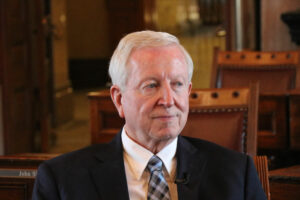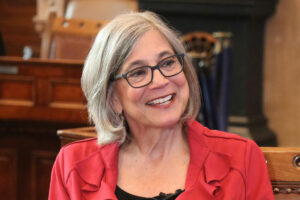Topic: Sales tax on food

Interview of Steve Morris, July 15, 2020
Interviewed by Joan Wagnon
Senate President Steve Morris gives a lengthy and detailed account of his twenty years in the Senate and his eight years as president. A former Hugoton school board member, Morris challenged a 16 year incumbent Democrat (Leroy Hayden) and won by a 2:1 margin in the 1992 election. During this period there were several high profile issues which Morris championed. Casino gambling passed in 2007 after a 12 hour filibuster. A coal-fired plant (Sunflower Electric) in Holcomb wanted to expand but Governor Sebelius vetoed that bill, twice. The Special Session of 2005 dealt with a Show MoreSupreme Court order to increase education funding to constitutional levels which took 12 days to develop a consensus. A 2010 transportation plan was passed during a recession. Morris initiated a three-university plan to increase the number of engineers in the state by 65 percent beginning in 2011, assisted by Senator Carolyn McGinn. Governor Sam Brownback's "tax experiment" which was passed in 2012 took huge amounts out of the transportation plan to close budget gaps. The interview contains a detailed account of the shenanigans that took place after the Senate refused to pass the Brownback bill. The Governor pleaded with Morris to reverse their action and send the bill to conference, which Morris did, only to find the House concurring to pass the original bill. Morris ran again, but was defeated in a Republican primary. Show Less

Interview of Susan Wagle, December 18, 2020
Interviewed by Alan Conroy
Former Kansas legislator Susan Wagle describes her interest in politics as "evolving over time." In this interview she candidly talks about her journey to become the first woman to break the glass ceiling and be elected to the top leadership position in the Kansas Senate. And she held onto the Senate Presidency for two terms. Wagle cites several events as having shaped her decision to run: getting a free pregnancy test and learning it was from an abortion clinic; seeing the huge property tax bills resulting from classification and reappraisal and how they angered people; enactment Show Moreof bingo legislation that affected he business negatively--all of which led to awareness that government could have an impact on families and businesses. Once in the Legislature, Wagle developed legislation to control property taxes. When an incumbent left a Senate seat, Wagle moved to the other chamber. She formed alliances in both the House and Senate with a group of conservative legislators enabling her to attain leadership positions. Wagle authored the Woman's Right to Know Act and solicited support from a prochoice Senator to get it passed--the first pro-life legislation. As a committee chair Wagle felt she had greater ability to pass bills that were needed. The issues she addressed ranged from protecting ground water from corporate hog farming, to tax-limiting measures, to ethics. Wagle credits her many years of service to listening to her constituents on issues such as taxation, quality of life, and education. In the closing of this interview, Wagle talks about her last year with COVID which she describes as "horrific" and disruptive. She reflects on her accomplishments changing the Board of Healing Arts and dealing with the Bioscience Authority. Show Less

Interview of Jim Gartner, February 16, 2024
Interviewed by Chris Courtwright
This interview sheds light on several activities related to the Kansas Legislature, particularly the role of lobbyist in decision making and the role of school boards in governance of education. It begins in 1967 with quite a tale of Gartner's service as a young Marine, wounded in VIetnam and how that impacted his career choices. A brief work experience building tires at Goodyear convinced him to get a college degree. Southwestern Bell Telephone hired him as one of the first male telephone operators in Kansas. He ended up as Vice President of External Affairs many years Show Morelater. He began his lobbying career in 1987 partnered with Denny Koch. Together they helped define deregulation and worked with both the legislature and the Kansas Congressional Delegation. In 2009 Gartner was appointed to the USD 437 school board to fill a vacancy. That's where he learned about school finance and governance. In 2016 Rep. Annie Tietze resigned and Gartner won that legislative seat. The House Taxation Committee was a logical appointment, given his lobbying background. The Brownback Tax Experiment was failing, and the legislature was eager to repeal it. Brownback vetoed the bill passed by the legislature; they quickly overrode his veto and restored more conventional tax policy. The interview concludes with a discussion of the food sales tax exemption proposed by Governor Kelly and Gartner's frustration with the legislative process and how it changed over the 30 years of his involvement. Show Less
